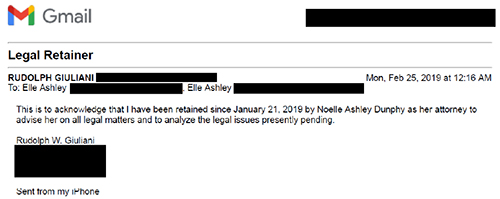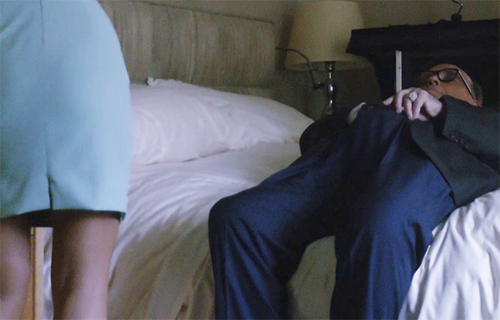Complaint against Jim Jordan and Mark Pomerantz
Alvin L. Bragg, Jr., vs. Jim Jordan and Mark Pomerantz
Case No. 23-cv-3032
by Alvin L. Bragg, Jr.
4/11/23
https://s3.documentcloud.org/documents/ ... erence.pdf
IN THE UNITED STATES DISTRICT COURT
FOR THE SOUTHERN DISTRICT OF NEW YORK
ALVIN L. BRAGG, JR., in his official capacity as
District Attorney for New York County,
Plaintiff,
v.
JIM JORDAN, in his official capacity as Chairman of the Committee on the Judiciary; COMMITTEE ON THE JUDICIARY OF THE UNITED STATES HOUSE OF REPRESENTATIVES; and MARK F. POMERANTZ,
Defendants.
Case No. 23-cv-3032
INTRODUCTION
1. Plaintiff District Attorney Alvin L. Bragg, Jr. brings this action in response to an unprecedently brazen and unconstitutional attack by members of Congress on an ongoing New York State criminal prosecution and investigation of former President Donald J. Trump. Beginning on March 20, 2023, Representative Jim Jordan, Chairman of the House Committee on the Judiciary (the “Committee”), began a transparent campaign to intimidate and attack District Attorney Bragg, making demands for confidential documents and testimony from the District Attorney himself as well as his current and former employees and officials. Two days after Mr. Trump was arraigned on 34 felony counts in New York State Supreme Court, Chairman Jordan and the Committee served a subpoena on Mark Pomerantz, a former Special Assistant District Attorney who participated in an investigation of Mr. Trump and his businesses. The subpoena seeks to compel Mr. Pomerantz to testify in a deposition on April 20, 2023. Chairman Jordan’s demands, including his subpoena to Mr. Pomerantz, seek highly sensitive and confidential local prosecutorial information that belongs to the Office of the District Attorney and the People of New York. Basic principles of federalism and common sense, as well as binding Supreme Court precedent, forbid Congress from demanding it.
2. Congress has no power to supervise state criminal prosecutions. Nor does Congress have the power to serve subpoenas “for the personal aggrandizement of the investigators or to punish those investigated.” Trump v. Mazars USA, LLP, 140 S. Ct. 2019, 2032 (2020) (quoting Watkins v. United States, 354 U.S. 178, 187 (1957)) (internal quotation marks omitted). Yet that is precisely what Chairman Jordan is trying to do. He and his allies have stated they want the District Attorney to come to Capitol Hill to “explain” himself and to provide “a good argument” to Congress in support of his decision to investigate and prosecute Mr. Trump. And they have threatened that the House of Representatives will “hold Alvin Bragg . . . to account” for indicting Mr. Trump. Now, Chairman Jordan has subpoenaed one of the District Attorney’s former Special Assistants to interrogate him about his official prosecutorial activities. But subpoenaing a former line prosecutor to talk about an ongoing criminal prosecution and investigation is no less of an affront to state sovereignty than subpoenaing the District Attorney himself. Chairman Jordan claims he is seeking to conduct “oversight.” But he has no power under the Constitution to oversee state and local criminal matters. By definition, then, he has no legitimate legislative purpose for issuing this subpoena. The subpoena threatens the sovereign powers of the States, confidence in the secrecy of grand jury proceedings, and the integrity of an ongoing criminal prosecution. This Court should enjoin its enforcement.
3. The Constitution “with[held] from Congress a plenary police power,” United States v. Lopez, 514 U.S. 549, 566 (1995), which “is controlled by 50 different States instead of one national sovereign,” Nat’l Fed. of Indep. Bus. v. Sebelius, 567 U.S. 519, 536 (2012); accord United States v. Morrison, 529 U.S. 598, 618 (2000). “[P]rimary authority” “for defining and enforcing the criminal law” is vested in the States. Lopez, 514 U.S. at 561 n.3. That division of authority requires that “[o]rdinarily” there should “be no interference with [state] officers,” who are “charged with the duty of prosecuting offenders against the laws of the State and must decide when and how this is to be done.” Younger v. Harris, 401 U.S. 37, 45 (1971). “Federal intrusions into state criminal trials frustrate both the States’ sovereign power to punish offenders and their goodfaith attempts to honor constitutional rights.” Engle v. Isaac, 456 U.S. 107, 128 (1982).
4. The charges the District Attorney filed against Mr. Trump were approved by citizens of New York. They did their civic duty as members of a grand jury pursuant to the federal Constitution and laws of the State of New York. Like any other defendant, Mr. Trump is entitled to challenge these charges in court. He can avail himself of all the processes and protections that New York State’s robust criminal procedure affords.
5. But rather than allowing the criminal process to proceed in the ordinary course, Chairman Jordan and the Committee are participating in a campaign of intimidation, retaliation, and obstruction. Mr. Trump in particular has threatened New York officials with violent and racist vitriol. At a March 25, 2023 rally, for instance, Mr. Trump stated that “the thugs and criminals who are corrupting our justice system will be defeated, discredited, and totally disgraced.”1 On social media, he threatened “death & destruction” and to wage “war” if he was indicted. Mr. Trump also called District Attorney Bragg a “SOROS BACKED ANIMAL”—a dog whistle Chairman Jordan repeated on television on March 23, 2023, calling District Attorney Bragg “the Soros-backed, new DA, left-wing DA Alvin Bragg.”2 Mr. Trump even shared a social media post that appeared to be a picture of himself threateningly wielding a baseball bat to District Attorney Bragg’s head.
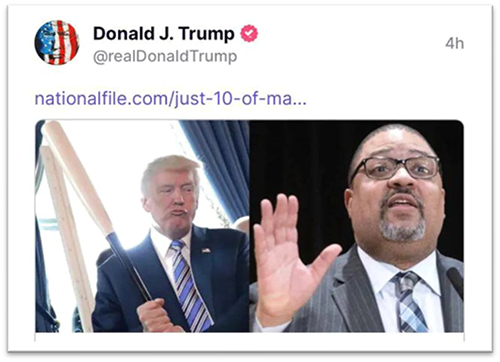
6. These statements have had a powerful effect. District Attorney Bragg has received multiple death threats. In one instance, he received a package containing suspicious white powder with a note making a specific death threat against him. Since Mr. Trump falsely predicted he would be arrested on March 18, 2023, in fact, the District Attorney’s Office has received more than 1,000 calls and emails from Mr. Trump’s supporters, many of which are threatening and racially charged. But rather than denounce efforts to vilify and denigrate the District Attorney and the grand jury process, House Republicans are participating in those efforts.3
7. Chairman Jordan, along with other congressmen, have made no secret that the purpose of the Committee’s inquiry is to “conduct oversight” and undertake an “examination of the facts” supporting the indictment—the same facts already evaluated by an independent grand jury of New Yorkers—and to hold the District Attorney “to account.” Chairman Jordan and the Committee have, in essence, appointed Congress as a super grand jury that can flex its subpoena power to second guess the judgment of New York citizens and interfere with the state criminal justice process. In his letters and public statements, however, Chairman Jordan and his congressional allies have changed their story multiple times, creating as it suits them a scattershot hodgepodge of new purported legislative interests and purposes that supposedly justify the Committee’s unwarranted “incursion” into a state criminal case. Printz v. United States, 521 U.S. 898, 920 (1997). Each of these is a baseless pretext for hauling Mr. Pomerantz to Washington for a retaliatory political circus designed to undermine the rule of law and New York’s police power. And in cases like this one implicating “substantial” federalism or separation of powers concerns, the Supreme Court’s decision in Mazars requires the federal courts to probe Congress’s asserted purposes for pretext and evidence. 140 S. Ct. at 2036. The Chairman has also admitted that subpoenaing Mr. Pomerantz is only the first step of his subpoena strategy. As Chairman James Comer of the House Committee on Oversight and Accountability put it, Mr. Trump’s allies in the House “fully expect to see Alvin Bragg answering questions in front of Congress as soon as [they] can make it happen.”4
8. Members of Congress are not free to invade New York’s sovereign authority for their or Mr. Trump’s political aims. Congress has no authority to “conduct oversight” into District Attorney Bragg’s exercise of his duties under New York law in a single case involving a single defendant. Nor can Congress force a former prosecutor to make extrajudicial statements during a criminal prosecution about that prosecution or related criminal investigations—statements that the New York Rules of Professional Conduct forbid, in part, because they could prejudice Mr. Trump’s right to a fair trial and prompt due process concerns. See N.Y.R. Prof. Cond. Rule 3.6; see also Powers v. Coe, 728 F.2d 97, 105 (2d Cir. 1984). Compelling Mr. Pomerantz to provide this type of testimony is unprecedented. As one former counsel for the House and legal scholar explained in testimony provided to Congress itself:
[T]here hasn’t been a subpoena enforcement against a state attorney general in 200 years . . . and there’s an excellent reason. State Attorneys General have their own state sovereign authority. They are frequently elected. They have their own base, their own electoral base, their own mission, and their mission is to pursue things that Congress can’t.5
9. Mr. Trump is free to avail himself of any and all criminal procedure processes available to him. Indeed, his motions in his criminal case are due in August. If he wishes to argue that his prosecution is “politically motivated,” he is free to raise that concern to the New York state criminal court. Chairman Jordan is not, however, free to unconstitutionally deploy Congress’s limited subpoena power for raw political retaliation, intimidation, or obstruction.
10. District Attorney Bragg therefore brings this action in response to the Committee’s plainly unconstitutional subpoena. He brings two causes of action.
11. First, the subpoena served on Mr. Pomerantz is invalid, unenforceable, unconstitutional, and ultra vires because it has no legitimate legislative purpose, Watkins, 354 U.S. at 187, and manifestly fails each of the four factors the Supreme Court established in Mazars to evaluate the enforceability of a congressional subpoena directed to another branch of government. 140 S. Ct. at 2035–36. Namely, Congress has no power under Article I of the Constitution to oversee, let alone disrupt, ongoing state law criminal matters, and the shifting array of legislative purposes the Chairman has invoked in favor of his demands do not “warrant[] the significant step” of seeking information from the District Attorney. Id. at 2035. The subpoena also is vastly “broader than reasonably necessary to support” the Chairman’s purported “legislative objective”— an objective the Chairman has provided not a whit of “evidence” to support. Id. at 2036. And finally, the subpoena is unduly burdensome, particularly in light of the ongoing criminal prosecution and investigation of Mr. Trump.
12. Second, even if Chairman Jordan and the Committee were able to demonstrate a valid legislative purpose and withstand the Mazars test (they cannot), the subpoena still would not be enforceable because it could allow the Committee to seek secret grand jury material, confidential investigative material, and information clearly protected by the attorney-client, work product, deliberative process, law enforcement, informant’s, and public interest privileges. These privileges exist to protect precisely the type of information Chairman Jordan and the Committee are seeking—confidential law enforcement and legal materials compiled during investigations and in the lead-up to a prosecution. The privileges are designed to prevent the type of obstruction and interference with ongoing criminal investigations and prosecutions that Chairman Jordan and the Committee’s actions represent.
13. In sum, Congress lacks any valid legislative purpose to engage in a free-ranging campaign of harassment in retaliation for the District Attorney’s investigation and prosecution of Mr. Trump under the laws of New York. That campaign is a direct threat to federalism and the sovereign interests of the State of New York. This Court should enjoin the subpoena and put an end to this constitutionally destructive fishing expedition. It should protect New York’s lawful pursuit of criminal justice and permit this State’s criminal justice system to function under the careful supervision of the New York Supreme Court free from unconstitutional congressional interference. This Court should grant judgment to District Attorney Alvin L. Bragg, Jr.
PARTIES
14. Plaintiff Alvin L. Bragg, Jr. is the District Attorney for Manhattan. District Attorney Bragg brings this suit in his official capacity.
15. Defendant Jim Jordan is a Republican member of the U.S. House of Representatives and Chairman of the Committee on the Judiciary. He is sued in his official capacity.
16. Defendant Committee on the Judiciary is a standing committee of the United States House of Representatives.
17. Defendant Mark F. Pomerantz was a Special Assistant District Attorney in the Manhattan District Attorney’s Office from 2021 to 2022. In that role, Mr. Pomerantz assisted with the Office’s investigation into Mr. Trump’s personal and business finances. On February 23, 2022, Mr. Pomerantz resigned his appointment.
18. The District Attorney sues Mr. Pomerantz to protect the District Attorney’s Office’s interests and privileges and in light of the District Attorney’s Office’s instruction to Mr. Pomerantz not to provide any information or materials relating to his work in the District Attorney’s Office in response to the subpoena. As the Supreme Court has made clear, the important structural constitutional interests at stake “are no less palpable here simply because the subpoena[] w[as] issued to [a] third part[y].” Mazars, 140 S. Ct. at 2035.
JURISDICTION AND VENUE
19. This Court has subject matter jurisdiction over this action under 28 U.S.C. § 1331 because this case arises under the Constitution and laws of the United States.
20. This Court has authority to issue a declaratory judgment and order other relief that is just and proper pursuant to 28 U.S.C. §§ 2201 and 2202.
21. Venue is proper in this District under 28 U.S.C. § 1391(b)(2) and (e)(1) because a substantial part of the events giving rise to this action occurred in the Southern District of New York. Chairman Jordan served Mr. Pomerantz with a subpoena in New York, where he resides. That subpoena seeks testimony relating to law enforcement investigations and an active prosecution the District Attorney is conducting in Manhattan and related grand jury proceedings.
22. This Court has personal jurisdiction over Chairman Jordan and the Committee under CPLR § 302 because they “engage[d] in [a] persistent course of conduct” and “expect[ed] or should reasonably expect the act to have consequences in the state.” The Chairman and the Committee have reached into New York State to serve a subpoena on Mr. Pomerantz, a former Special Assistant in the Manhattan District Attorney’s Office, as part of an ongoing effort to obstruct, impede, and delegitimize a local criminal prosecution in New York City. They have also demanded documents and testimony from three other New Yorkers, including the District Attorney himself. By his own reckoning, Chairman Jordan and the Committee are seeking to conduct “oversight” of an ongoing New York State criminal investigation and an ongoing New York State criminal prosecution pending in New York State court. They are seeking highly sensitive and confidential prosecutorial information concerning an ongoing local prosecution and investigation the District Attorney’s Office is properly conducting on behalf of the People of New York. They have thereby purposefully availed themselves of this forum and subjected themselves to personal jurisdiction in the State of New York in connection with this controversy.
23. The Chairman and the Judiciary Committee have also availed themselves of this forum by planning to hold a field hearing in New York City on April 17, 2023 regarding the District Attorney’s prosecutorial policies.
24. This Court has personal jurisdiction over Mr. Pomerantz because he is a resident of New York.
FACTUAL ALLEGATIONS
A. District Attorney Bragg Takes Office And Reduces Crime In New York City.
25. The Manhattan District Attorney’s Office investigates and prosecutes violations of New York State law. New York State law confers on district attorneys the authority “to prosecute all crimes and offenses cognizable by the courts of the county for which he shall have been elected or appointed.” N.Y. County L. § 927; see also id. § 700. Each case the Office brings is brought on behalf of “The People of the State of New York.”
26. Plaintiff Alvin L. Bragg, Jr. is the first Black person to serve as District Attorney of Manhattan. District Attorney Bragg has spent two decades in public service, having previously served as Chief Deputy Attorney General in the New York Attorney General’s office and as an Assistant United States Attorney in the Southern District of New York. As a long-time white collar prosecutor, District Attorney Bragg believes in holding powerful people accountable for harming everyday New Yorkers.
27. As of April 2, 2023, the year-to-date statistics for New York City, and Manhattan specifically, continue to trend downward: homicides are down 14.3% and down further in Manhattan; shooting incidents are down 17.3%; rapes are down 33.3% and down further in Manhattan; robbery is down 7.6% and down further in Manhattan; and burglary is down 21% and down further in Manhattan. Total index crimes are down 1.3% in Manhattan, despite being up slightly citywide. The work of the District Attorney’s Office in the last year is contributing to these successes. Gun prosecutions by the Office were up approximately 18% in the District Attorney’s first year in office. Last year, the District Attorney’s Office secured indictments against gun traffickers, ghost gun manufacturers, and members of a violent criminal enterprise. The Office is also making use of available tools to reduce recidivism: with recent amendments to bail eligibility the Office has sought bail in 400 property crime cases that would not have been baileligible otherwise. And in just the past week, the Office has required landlords to initiate civil eviction proceedings against seven unlicensed cannabis shops that are operating unlawfully in Manhattan.
B. District Attorney Bragg Continues His Predecessor’s Investigations Into Mr. Trump.
28. When he assumed office on January 1, 2022, District Attorney Bragg inherited years-long investigations into the financial activities of Donald J. Trump and the Trump Organization. District Attorney Bragg issued a public statement on April 7, 2022, confirming that his Office had continued the investigations through its staff of experienced career prosecutors.
29. District Attorney Bragg also inherited an indictment of two Trump entities (Trump Corporation and Trump Payroll Corp.) and Allen Weisselberg, the former chief financial officer of the Trump Organization. The charges against the Trump entities went to trial with opening statements beginning on Monday, October 31, 2022. Donald Trump announced his candidacy for President the next month, while the trial and previously announced investigations by the District Attorney remained ongoing.
30. District Attorney Bragg’s Office secured the trial conviction of the two Trump entities and a guilty plea from Mr. Weisselberg for, among other crimes, defrauding New York State and New York City tax authorities. Following the trial verdict in December of 2022, a New York State court fined the Trump Corporation and the Trump Payroll Corp. $1.6 million for running the decade-long tax fraud scheme and sentenced Mr. Weisselberg to five months incarceration followed by five years’ probation.
31. Other investigations remained ongoing. The New York State Constitution Bill of Rights establishes that all “capital or otherwise infamous crime[s]” must be brought through a grand jury indictment. N.Y. Const. Art. I § 6; see also U.S. Const., amend. V. A grand jury in New York consists of 23 New Yorkers who must decide whether documents, witness testimony, and other evidence presented by prosecutors supports returning an indictment for violations of New York law. Grand jurors are selected at random from the general population of New York County without regard to their personal political affiliation.
32. In early 2023, the news media reported on a grand jury investigation into allegations against Mr. Trump and the possibility that Mr. Trump might be criminally charged. In response, Mr. Trump and his supporters in Congress launched efforts to attack the District Attorney’s integrity, intimidate his Office, and mount “an aggressive response” to preempt potential criminal charges.6 House Republicans regularly kept Mr. Trump updated on these developments. For example, Representative Marjorie Taylor Greene “keep[s] him up[dated] on everything that [they’re] doing,” and House Republican Conference Chair Elise Stefanik has “walked [Mr. Trump] through the GOP’s plans for an aggressive response to Bragg.”7 It has been reported that Mr. Trump has himself been preparing plans to exact revenge on District Attorney Bragg if Mr. Trump returns to the White House in 2024. Some of his advisors have reportedly recommended that he “unleash” the Department of Justice’s “Civil Rights Division” to prosecute District Attorney Bragg “for supposedly ‘racist law enforcement practices.’”8
33. The effort to obstruct the grand jury’s investigation into Mr. Trump picked up steam on March 10, 2023. On that day, Mr. Trump’s lawyer, Joseph Tacopina, sent Chairman Jordan a letter describing District Attorney Bragg as a “rogue local district attorney.”9 Mr. Tacopina urged Chairman Jordan to deploy the powers of his office to investigate what he described as District Attorney Bragg’s “egregious abuse of power.”10
34. On March 18, 2023, Mr. Trump announced on Truth Social, his social media platform, that he believed he would be arrested the following Tuesday. Mr. Trump claimed to have sourced this information—which was false—from “ILLEGAL LEAKS” in the “CORRUPT & HIGHLY POLITICAL MANHATTAN DISTRICT ATTORNEYS OFFICE.” Mr. Trump urged his supporters to “PROTEST, TAKE OUR NATION BACK!”
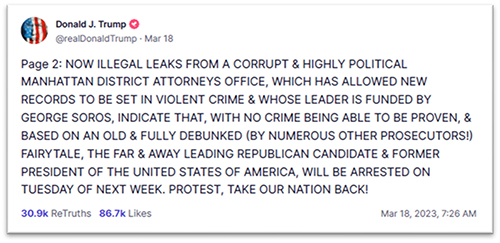
35. Mr. Trump’s post calling for “protest[s]” bears a striking resemblance to the December 19, 2020 tweet in which he urged his supporters to protest after he lost the 2020 Presidential election: “Big protest in D.C. on January 6th. Be there, will be wild!”11 The House Select Committee to Investigate the January 6th Attack on the U.S. Capitol concluded that Mr. Trump’s December 19, 2020 tweet served as “a call to arms” for “extremists and conspiracy theorists” that had the effect of “summoning a mob.”12 “For the Proud Boys . . . President Trump’s tweet set in motion a chain of events that led directly to the attack on the U.S. Capitol.”13
36. Mr. Trump was not arrested the following Tuesday, March 21, 2023, as he had predicted on social media. Although his prediction was false, his call to “protest” and “take our nation back” prompted law enforcement agencies to deploy a significant security response, including around the New York State Supreme Court criminal courthouse in lower Manhattan and the District Attorney’s Office.
37. Meanwhile, on March 19, 2023, House Speaker Kevin McCarthy amplified Mr. Trump’s incendiary rhetoric, accusing District Attorney Bragg of “abusing his office to target President Trump” and announced that Congress would “investigate any use of federal funds that are used to facilitate the perversion of justice by Soros-backed DA’s across the country.” George Soros is a Jewish American businessman and philanthropist known for his support of liberal causes and candidates. He is frequently cited as a boogeyman in rightwing, and often anti-Semitic, conspiracy theories and dog whistles. District Attorney Bragg does not know Mr. Soros and has never communicated with him.
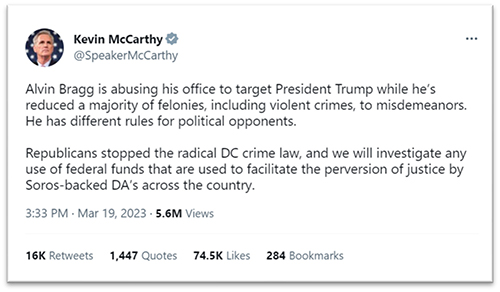
38. Other House Representatives have also expressed their support for Mr. Trump. House Republican Conference Chair Stefanik frequently speaks with Mr. Trump and has expressed that she believes District Attorney Bragg should testify before Congress to explain his decision to investigate the former president. Representative Greene, a member of the Committee on Oversight and Accountability, also frequently speaks with Mr. Trump and has called for District Attorney Bragg’s arrest. On March 22, 2023, she falsely tweeted that District Attorney Bragg was “breaking the law” and “trying to incite civil unrest with his Soros funded political war.”
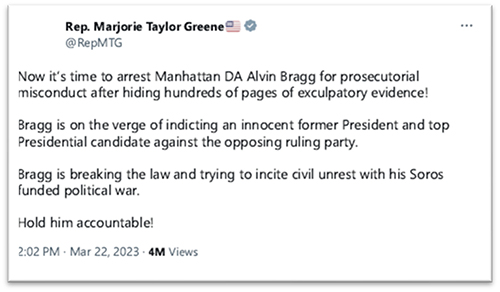
C. Chairmen Of Three Congressional Committees Send A Letter Requesting Documents and Testimony from District Attorney Bragg, Mr. Pomerantz, and Carey Dunne.
39. After receiving the letter from Mr. Trump’s counsel and in the wake of Speaker McCarthy’s tweet vowing an investigation, on March 20, 2023, chairmen of three Congressional committees sent a letter to District Attorney Bragg purporting to launch an investigation into his “decision to pursue such a politically motivated prosecution.”14 The signatories included Chairman Jordan, Chairman Comer, and Chairman Bryan Steil of the Committee on House Administration (together the “Chairmen” and the “Committees,” respectively).
40. The letter blithely accused District Attorney Bragg of “an unprecedented abuse of prosecutorial authority: the indictment of a former President of the United States and current declared candidate for that office.” And it demanded that District Attorney Bragg give testimony and produce the following three categories of documents for the period January 1, 2017 to the present:
“1. All documents and communications between or among the New York County District Attorney’s Office and the U.S. Department of Justice, its component entities, or other federal law enforcement agencies referring or relating to your office’s investigation of President Donald Trump;
2. All documents and communications sent or received by former employees Carey Dunne and Mark Pomerantz referring or relating to President Donald Trump; and
3. All documents and communications referring or relating to the New York County District Attorney Office’s receipt and use of federal funds.”
41. The Chairmen stated that their requests were based on Rule X of the Rules of the House of Representatives and the need for (1) “congressional scrutiny about how public safety funds appropriated by Congress are implemented by local law-enforcement agencies,” (2) “oversight to inform potential legislative reforms about the delineation of prosecutorial authority between federal and local officials,” and (3) “consider[ation] [of] legislative reforms to the authorities of special counsels and their relationships with other prosecuting entities.”
42. Rule X of the Rules of the House of Representatives identifies the jurisdictions and functions of the standing committees in the House, including the Committee on the Judiciary, the Committee on House Administration, and the Committee on Oversight and Accountability.
43. On March 22, 2023, Chairman Jordan sent letters to Mr. Pomerantz and Carey Dunne. Mr. Dunne was the General Counsel to former Manhattan District Attorney Cyrus Vance Jr. from 2017 to 2021 and Special Assistant District Attorney to District Attorney Bragg from January 1, 2022 to February 24, 2022. In those roles, Mr. Dunne helped lead the District Attorney’s investigation into Mr. Trump’s tax records and the Trump Organization’s tax-fraud scheme.
44. The letters to Mr. Pomerantz and Mr. Dunne both requested their “cooperation with [the Chairmen’s] oversight of this politically motivated prosecutorial decision” and “overzealous” investigation. Specifically, the letters requested the following documents and information for January 1, 2017 to the present from Mr. Pomerantz and Mr. Dunne, both of whom have not worked at the District Attorney’s Office in about a year:“1. All documents and communications between or among the New York County District Attorney’s Office and the U.S. Department of Justice, its component entities, or other federal law enforcement agencies referring or relating to New York County District Attorney’s investigation of President Donald Trump;
2. All documents and communications between or among you and the New York County District Attorney’s Office referring or relating to President Donald Trump; and
3. All documents and communications between or among you and representatives of the New York County District Attorney’s Office referring or relating to your appointment and role as Special Assistant District Attorney for New York County.”
45. The letter to Mr. Pomerantz stated that he had previously “resign[ed] in protest” of a decision by District Attorney Bragg to “suspend[] the investigation” into Mr. Trump when District Attorney Bragg took office. The letter went on to state that Mr. Pomerantz’s actions “both as a special prosecutor and since leaving the District Attorney’s office, cast serious doubt on the administration of fair and impartial justice in this matter,” and alleged that Mr. Pomerantz had “unfairly disparaged” Mr. Trump, “an innocent and uncharged man, as a felon to millions of [New York Times] readers.” The letter further stated that Mr. Pomerantz’s “book again unfairly disparaged President Trump, and now opens the door to examination about the District Attorney’s office [sic] commitment to evenhanded justice.”
D. District Attorney Bragg Responds.
46. District Attorney Bragg’s Office timely responded to the demand on March 23, 2023. Leslie Dubeck, General Counsel for the Manhattan District Attorney’s Office, wrote in a letter to the Chairmen that the investigation into Mr. Trump “is one of thousands conducted by the Office of the District Attorney in its long history of pursuing justice and protecting New Yorkers” and “has been conducted consistently with the District Attorney’s oath to faithfully execute the laws of the State of New York.” In the letter, Ms. Dubeck states that the request by the Chairmen “is an unprecedented inquiry into a pending local prosecution,” which came only “after Donald Trump created a false expectation he would be arrested the next day and his lawyers reportedly urged [the Chairmen] to intervene.”
47. The letter states that compliance with the Chairmen’s request “would interfere with law enforcement.” Specifically, the Chairmen’s request “seeks non-public information about a pending criminal investigation, which is confidential under state law” because “[g]rand jury proceedings are secret.”
48. The letter also states that the requests “are an unlawful incursion into New York’s sovereignty” because a “Congressional committee may not ‘inquire into matters which are . . . reserved to the States,’” and “[p]erhaps the clearest example of traditional state authority is the punishment of local criminal activity.” It explained that the District Attorney’s investigation is a “quintessential police power[] belonging to the State” and because the Chairmen’s inquiry “treads into territory very clearly reserved to the states,” it is “indefensible.” The letter further explained that the requests would “usurp[] executive powers” because “Congress [is not] a law enforcement or trial agency.” Ms. Dubeck also made clear that the District Attorney’s Office was not “pursuing a prosecution for political purposes.”
49. Notwithstanding these objections, Ms. Dubeck stated that the District Attorney’s Office would submit a letter describing its use of federal funds. Ms. Dubeck further stated that “this Office will always treat a fellow government entity with due respect” and requested the opportunity to meet and confer regarding the Chairmen’s inquiry.
E. Former President Donald Trump Launches Attacks on Social Media and Puts District Attorney Bragg And Other New Yorkers at Risk.
50. Following the parties’ letter exchanges, Mr. Trump began to lob even more incendiary messages on Truth Social about District Attorney Bragg. On March 23, 2023, he inveighed that “BRAGG REFUSES TO STOP DESPITE OVERWHELMING EVIDENCE TO THE CONTRARY” and described the District Attorney in dehumanizing terms, calling him a “SOROS BACKED ANIMAL.” These attacks by Mr. Trump and others have been widely condemned as both racist and antisemitic.
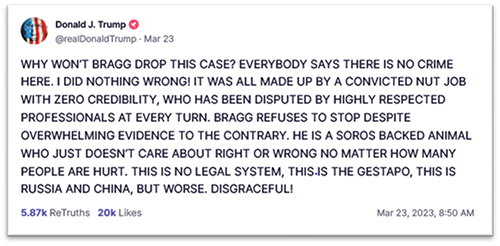
51. Minutes later, Mr. Trump accused District Attorney Bragg of “CARRYING OUT THE PLANS OF THE RADICAL LEFT LUNATICS.” He also stated that “OUR COUNTRY IS BEING DESTROYED, AS THEY TELL US TO BE PEACEFUL!”
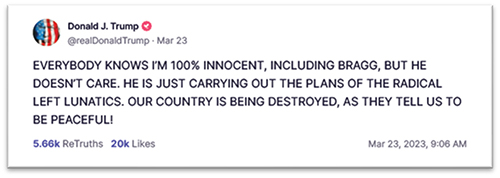
52. Also on that day, Mr. Trump shared a photograph on Truth Social of a side-by-side image of himself and District Attorney Bragg. Mr. Trump was holding a baseball bat in the photograph, and their side-by-side juxtaposition suggested that Mr. Trump was winding up the bat to strike the District Attorney.
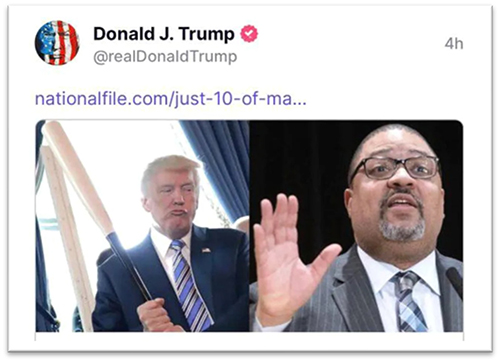
53. In the early hours of March 24, 2023, Mr. Trump threatened that an indictment would unleash “death & destruction” that would be “catastrophic for our Country.” Mr. Trump queried: “What kind of person can charge another person, in this case a former President of the United States, . . . when it is known by all that NO Crime has been committed[?]” He then supplied his followers with an answer, alluding to District Attorney Bragg: “Only a degenerate psychopath that truely [sic] hates the USA.”
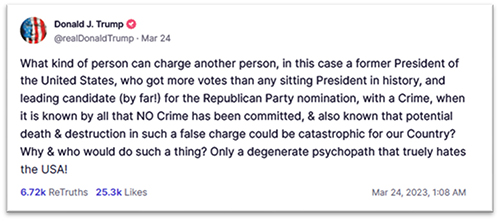
54. Later that day, a package containing suspicious white powder arrived at the District Attorney’s Office along with a note making a specific death threat against the District Attorney. The New York City Police Department and the Department of Environmental Protection responded and ultimately concluded the substance was not dangerous.
55. In the aftermath, the District Attorney’s Office received more than 1,000 calls and emails from individuals claiming to be Mr. Trump’s supporters, many of which were threatening and racially charged. District Attorney Bragg also received multiple death threats.
F. The Chairmen Continue to Insist on Document Production and Testimony.
56. On March 25, 2023, the Chairmen sent District Attorney Bragg’s Office another letter. They ignored Ms. Dubeck’s request to meet and confer.
57. The letter states that the Committees are “conducting oversight of [the Manhattan District Attorney’s Office’s] reported effort to indict a former President of the United States and current declared candidate for that office.” The Chairmen, for the first time, declared that they were considering whether Congress “should take legislative action to protect former and/or current Presidents from politically motivated prosecutions by state and local officials.”
58. The letter claimed that the inquiry is proper because (1) the Committees “are authorized to conduct such an inquiry,” (2) “the inquiry is on a matter on which legislation could be had,” and (3) “the requests are pertinent to the committees’ inquiry.”
59. The letter further explains that the inquiry into the circumstances of a prosecutorial decision to indict a former President of the United States “on a novel and untested legal theory” falls within the scope of the Committee on the Judiciary’s “oversight of criminal justice matters to inform potential legislation.” It also states that the inquiry could inform whether Congress drafts legislation to “insulate current and former presidents from such improper state and local prosecutions”—purported legislation the Chairmen did not even hint at in their March 20, 2023 letter. The Chairmen speculated without any evidence that these prosecutions could create a conflict “between the federal law-enforcement officials required to protect the former President and local law-enforcement officials required to enforce your indictment.” Despite the District Attorney’s Office’s commitment to provide a letter detailing the use of the Office’s federal funds, the Chairmen reiterated their request for such information and insisted that a letter from the District Attorney’s Office would not be enough. The Chairmen requested a response by March 31, 2023.
60. Subsequently, on an interview with CNN’s Jake Tapper, Chairman Comer was asked about the Chairmen’s letters to District Attorney Bragg.15 Chairman Comer candidly explained his view that the District Attorney should “come explain to us exactly what he’s investigat[ing].” He further stated, “if Mr. Bragg wants to come in and explain to us what he is doing and he makes a good explanation, . . . then we’ll back off.” And when Mr. Tapper noted, “well, he’s investigating as I understand it potential violations of state crimes,” Chairman Comer responded: “even at that, . . . when you look at what we believe the role of the Manhattan DA should be is to fight crime. I mean that’s one of the biggest issues in New York.” He went on to state, “we believe our tax dollars would be better spent prosecuting local criminals—that’s what a DA is supposed to do.” Mr. Tapper also asked: “if [District Attorney Bragg] refuses to come in willingly, will you subpoena him?” Chairman Comer responded: “Well, that’ll be up to Jim Jordan. He’s the lead investigator in this particular situation.” Mr. Tapper queried in response: “Jim Jordan who refused to comply with a congressional subpoena in the previous Congress?”
61. Also on March 25, 2023, Ms. Dubeck sent a letter to Mr. Pomerantz and Mr. Dunne instructing them, as former employees of the District Attorney’s Office, to not respond to Chairman Jordan’s requests in light of the ongoing discussions and concerns over the inquiry. In that letter, the District Attorney’s Office explained that the Chairmen’s requests “raise significant concerns about federalism, state sovereignty, the limits on congressional power, and the purpose and legality of the [Judiciary Committee’s] inquiry. In addition, the documents and information requested are protected from disclosure for many reasons, including because they relate to an ongoing criminal investigation, and are subject to the attorney client privilege, work product doctrine, and other legal protections.”
62. The letter specifically instructed Mr. Pomerantz to “as a former employee and attorney of the DA’s Office, [] not provide any information or materials relating to your work in the DA’s Office in response to [the Judiciary Committee’s] request. In addition, please direct [the Judiciary Committee] to communicate with the DA’s Office regarding the request.” The letter made clear the District Attorney’s Office was writing “[t]o protect the DA’s Office’s interests and privileges” and had asked the Committee “to provide additional information regarding their inquiries.”
G. Donald Trump Persists in His Attacks on Social Media.
63. On March 28, 2023, Mr. Trump re-posted to his Truth Social account an article by Wayne Allyn Root titled “Democrats Want to Indict & Arrest President Trump. They Want a War? Let’s Give it to Them.” That same day, a supporter of Mr. Trump who was protesting District Attorney Bragg’s investigation pulled a knife on a family—including two small children— outside the Manhattan Criminal Court. Court officers arrested the protester, who was holding a sign that read: “I support Trump, do you?”
64. On March 29, 2023, following news reports that the grand jury had recessed for several weeks, Mr. Trump continued his attacks on Truth Social. He stated that he had “GAINED SUCH RESPECT FOR THIS GRAND JURY” for not being a “RUBBER STAMP” and described District Attorney Bragg as “HIGHLY PARTISAN” and “HATEFUL.”
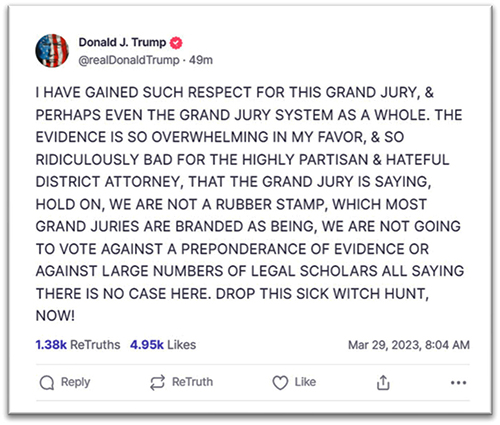
65. A day later, on March 30, 2023, Mr. Trump described District Attorney Bragg as a “Radical Left, Soros Backed Lunatic[]” in a post on Truth Social. He also implied that a New York Times columnist wrote that Mr. Trump “should be prosecuted” “because [he is] WHITE.” He concluded “we are now a Nation in Decline being stupidly led into World War III.”
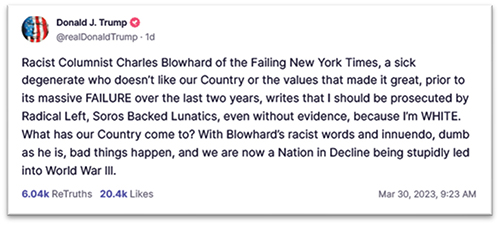
H. Mr. Pomerantz and Mr. Dunne Respond.
66. On March 27, 2023, Mr. Pomerantz responded to Chairman Jordan’s March 22, 2023 correspondence. In the letter, Mr. Pomerantz states that he will “act in a manner consistent with the instructions [he has] received from DANY” and requested that Chairman Jordan relay any communication to the District Attorney’s Office.
67. That same day, Mr. Dunne also responded to Chairman Jordan’s March 22, 2023 correspondence. Like Mr. Pomerantz, Mr. Dunne declined to respond to the inquiry and referred any communication to the District Attorney’s Office. In the letter, Mr. Dunne also stated that the District Attorney’s Office is the legal holder of various privileges, including the attorney-client privilege, implicated by Chairman Jordan’s inquiry. The letter further states that “[a]s the legal holder of such privileges,” the Office’s position that the inquiry was “constitutionally infirm” was “[their] prerogative.”
I. New York State Supreme Court Unseals The Fact That Mr. Trump Has Been Indicted And The Chairmen (And Other Members Of Congress) React.
68. On March 30, 2023, the New York State Supreme Court issued an order unsealing the fact that a Manhattan grand jury had returned an indictment charging Mr. Trump with a certain number of undefined crimes. Mr. Trump is the first American president, current or former, to be indicted.
69. It did not take long for Mr. Trump to start casting doubt on the integrity of the District Attorney’s Office, and on the judicial system as a whole. On March 30, 2023, he claimed that the charges against him were “Fake, Corrupt, and Disgraceful.” And on the morning of March 31, 2023, he asserted on Truth Social: “The Judge ‘assigned’ to my Witch Hunt Case [] HATES ME.” He further stated that the judge’s name “is Juan Manuel Marchan [sic], [he] was handpicked by Bragg & the Prosecutors, & is the same person who ‘railroaded’ my 75 year old former CFO, Allen Weisselberg, to take a ‘plea’ deal.”
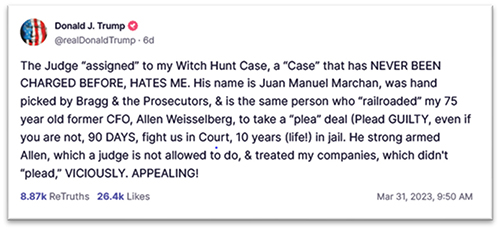
70. Later that day, Mr. Trump posted again on Truth Social, specifically referencing Mr. Pomerantz:
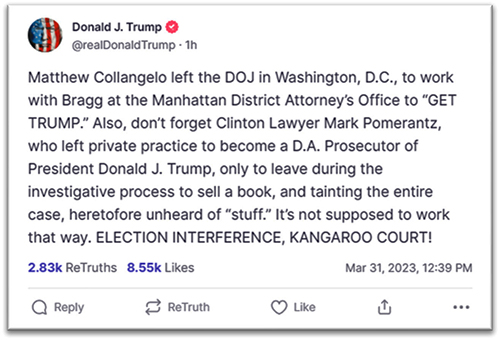
71. Mr. Trump’s followers have followed suit. Hours after the indictment, District Attorney Bragg and his Office received numerous overtly racist and antisemitic emails and messages.16 One email stated: “Hay George Soros a** hole puppet If you want President Trump come and get me to. Remember we are everywhere and we have guns.” Other messages called the District Attorney “black trash [f----r]” and “Aids Infested.”

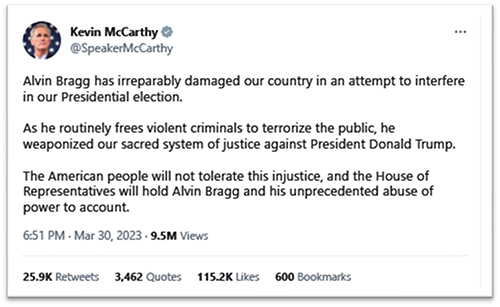
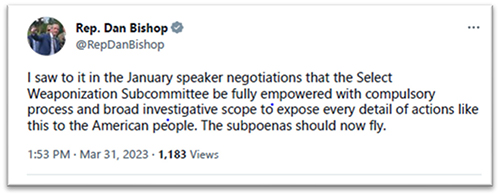
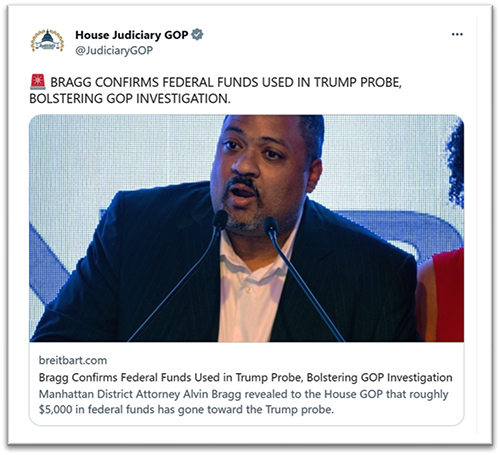
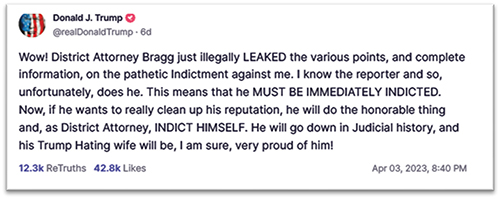
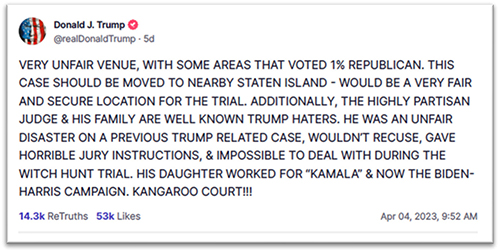
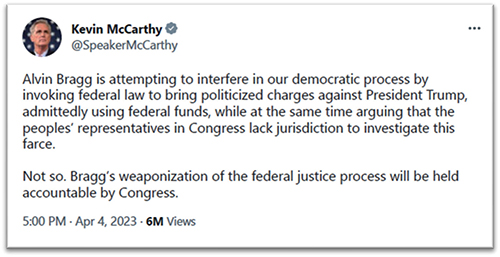
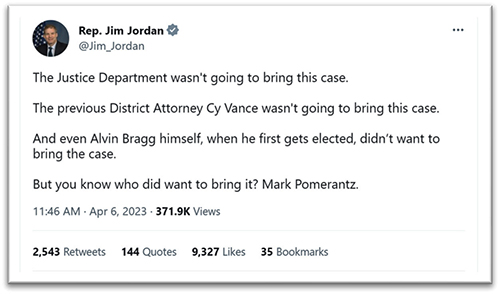
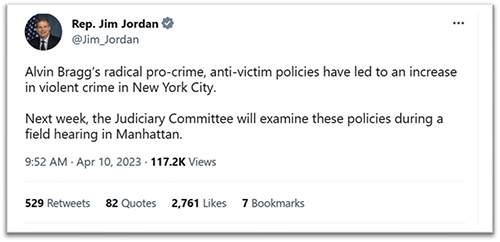
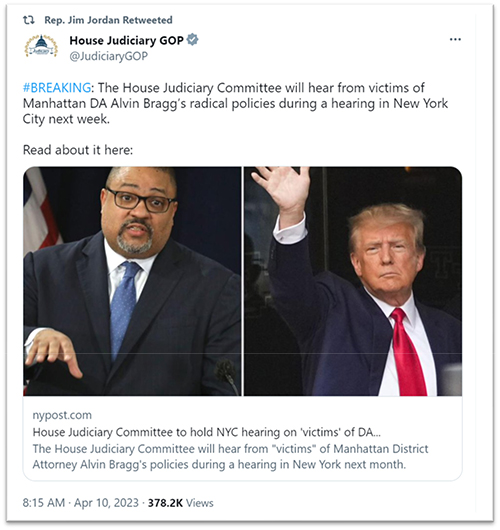
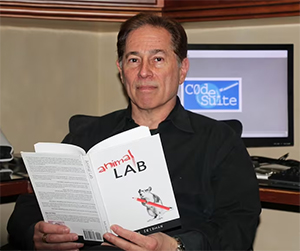
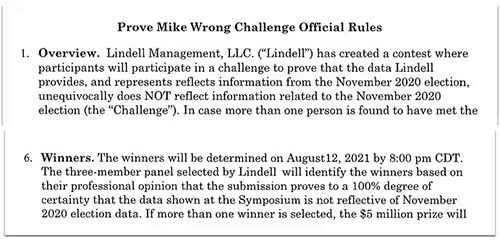
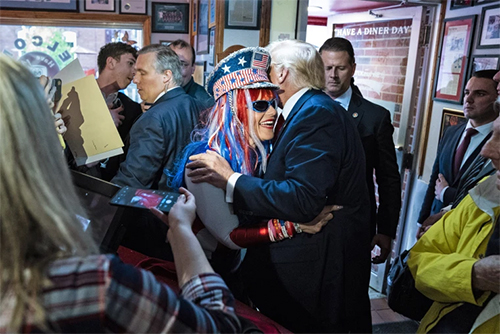
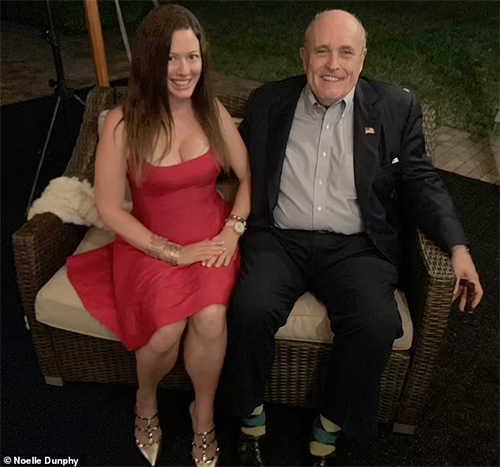 [/quote]
[/quote]